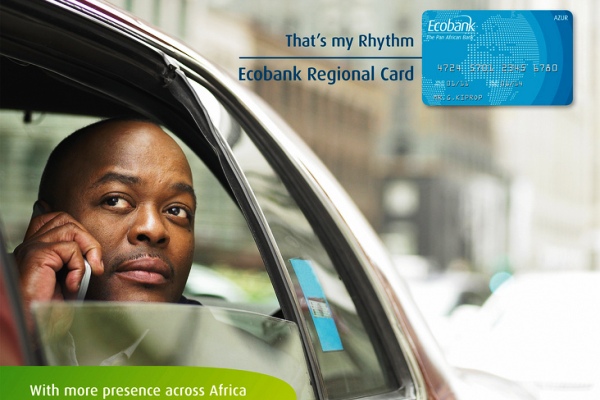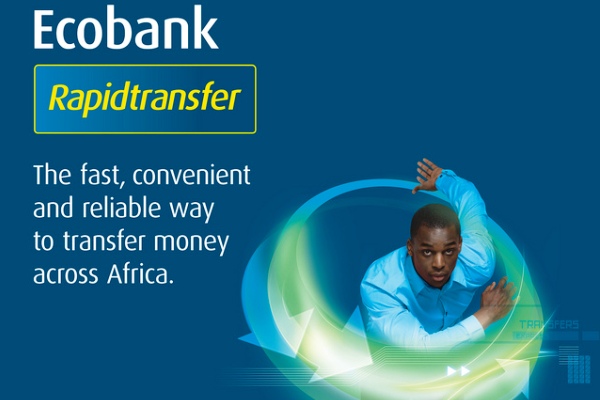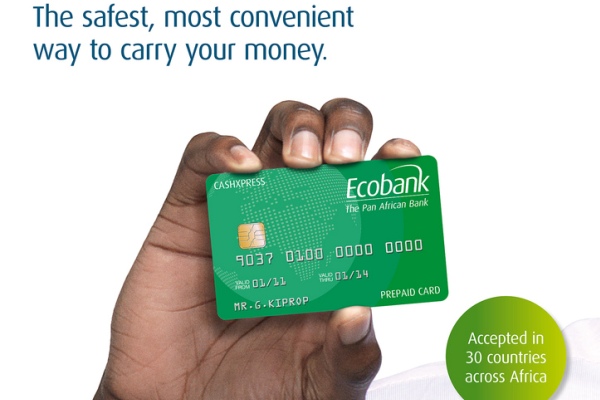Ecobank Ghana: Supporting the Growing Economy of Ghana
Rosemary Yeboah, Executive Director of Ecobank Ghana (Biography), discusses the issue of high interest rates in the country. She also mentions some of the bank’s competitive advantages and challenges to be faced, and shares her vision for the future of the bank.
Interview with Rosemary Yeboah, Executive Director & Group Head Corporate Banking of Ecobank Ghana
The banks in Ghana set their interest rates very high for all businesses. Can you tell us about the interest rates here at the moment?
One of the critical aspects of our value proposition is managing the mirrored footprints of our corporates, working with local knowledge to provide sound advice to our customers. Evidently, we are in more markets than most banks located in Africa, and that in itself makes a difference.
The economy is growing at GDP rates of over 7% annually, and aligned to that, the corporate sectors are also growing. There are several businesses that are created within the SME sector. The issue centres on understanding the perception of risk for this sector. Part of this includes educating SMEs and other local corporates, with regard to managing their cashflows and managing their resources adequately. For some of these companies, proper management of their accounts is critical if they are to manage their risks well and obtain a better business credit profile. They also have to appreciate how they can grow their business in a way that will enhance their profile. Managing the perception of risk within this sector is at the heart of pricing rates applicable to this important sector.
I agree with you that SMEs should make all of these improvements but when it comes to large local corporations that have their own management systems, they also face exactly the same problems of very high interest rates, therefore what is your approach to these companies?
The local large companies would ordinarily have grown from SMEs into local corporates and you find that management of their cash flows is better than what you will find with SMEs that have just commenced operations. You will find that local corporates may have grown from being a value chain supplier or distributor. Working with supplies or distributorship of goods in partnership with a multinational, enables them align to best practices of some of these larger companies. They are able to learn some of the basic principles of cash flow management, provide better accounts, and manage their risks well with better forecasting of their business requirements. This makes it easier for banks to finance them because of the successful links they have formed working within the value chain. Those that stand alone and are not linked to a value chain have a much more difficult profile to work with. They may well be innovative, however they have a much steeper learning curve and would have to find ways of building a successful business profile to enable a better credit risk assessment profile. They need to appreciate how to manage their resources and cash flow better so that banks can understand and price their risk properly. We need to do more of this education.

The pricing environment is high but I think that increasingly where a bank can structure a good transaction well, pricing can be managed downwards.
So there are high interest rates right now in Ghana and there is also a danger of high inflation which can threaten the growth of the economy. Is the Central Bank of Ghana addressing that issue in terms of fighting the inflation rate and trying to reduce the interest rates?
Yes, I think the issue at the heart of the Central Bank is ensuring the SMEs and local corporates remain relevant within the market – the growth of these sectors is critical for the economy of Ghana. The growth of SMEs into businesses helps create employment, so management of both the interest rate and inflation environment is core to the Central Bank´s policies. Recently the Central Bank came up with a base rate structure that is still being managed and implemented working with each bank to price base rates better to address the problem, among other issues. I think that you will see that treasury bill rates that were previously high have also started to trend downwards. This is favourable because a lower treasury bill rate -one of the benchmarks in general for calculating base rates – will lessen pressure on pricing SME and local corporate risk.
What kind of level do you expect the interest rates to reach?
Only a few years ago, interest rates were around 12%. I think the expectation is to bring the current levels down. It is currently approx 19% and expecting it to trend further down perhaps to approximately 15%.
You have grown rather rapidly, was that due to acquisitions or organic growth?
It is a mixture of both acquisition and organic growth. Just over a year ago, TTB was integrated into Ecobank.
I think that the Ecobank Pan-African strategy really underpins this growth because our dual purpose is to grow across Africa and to integrate Africa economically and financially. This is what has underpinned our strategy and in doing translates into dealing with regional corporates which are essentially the growing African multinationals. These require a different kind of attention. This strategy has underpinned our growth, providing end to end cross border solutions across our network.

Looking at the market, what would you say is the key competitive advantage of Ecobank? Ghana is a country that is very open for banks; there are a lot of banks here, so what makes Ecobank stand out from the rest?
What makes us stand out is the dual purpose strategy, with the focus on integrating Africa economically and financially. Underpinning this, is our drive for providing outstanding customer service, which I think is one of the key areas at the forefront of the bank strategy right now. The focus is on ensuring that our networked platform operates seamlessly. We also want to make sure that we leverage on our strong balance sheet, bringing value to our customers both in terms of financing and also in terms of outstanding customer service delivery.
In terms of corporate banking, what distinguishes Ecobank?
What distinguishes the corporate bank is mainly our strong leverage of the platform of networked subsidiaries. Our approach to corporate management includes working with the global account manager concept which provides one point of contact for each corporate, working with our mutual footprints to provide a structured approach to cross border transaction. Our product range covering trade and cash management solutions underpinned by straight through processing of internet banking transactions, provides a unique basis for close partnering with corporates locating and expanding their businesses across Africa. We also have a strong research and advisory platform that delivers outstanding service and advise to corporates operating and entering new markets in Africa.
Infrastructure is key for Ghana, and for the Ghanaian banking sector, we ensure that we leverage on our strong balance sheet to provide adequate financing to the growing energy, oil and gas sectors…
A large, multinational corporation could bank with you and get the same service with you all over Africa but they could also bank with a large, multinational bank that will also have a presence all over Africa… Would you say that your competitive advantage over these banks is that you are African and therefore you understand the market better?
Absolutely. One of the critical aspects of our value proposition is managing the mirrored footprints of our corporates, working with local knowledge to provide sound advice to our customers. Evidently, we are in more markets than most banks located in Africa, and that in itself makes a difference. The markets we choose to be in are invariably the markets of interest to the multinationals. We provide local knowledge but at the same time bring value to the table as an international African bank. This dual characteristic matches the requirements of the multinational.
It is great that at last there is an African international bank. Now, as you are in contact with SMEs all the time, what would you say are the main concerns that new SMEs may have?

It is critical for SMEs to receive attention and understanding of their businesses. SMEs require a bank to understand them and be innovative enough to match their requirements. They need banks to look at them closely, to appreciate and understand their markets and the risks they are confronted with. Banks have to move away from operating from a rigid banking platform, inflexible to appreciating the needs of the SME, considering them to be high risk and pricing their risk without a clear understanding of their markets. Banks need to appreciate how to structure their transactions, and also adjust their internal platform to enable them monitor the SMEs business processes well. Close monitoring will support not only the bank but also the SME, enabling them to reconcile and manage their cash flows and risk profile better. Providing innovative solutions is key, and amending our platform is one of the key actions that has led us in providing mobile banking solutions adequately across the country.
In terms of the population of Ghana, only a tiny fraction have a bank account which shows that banking is a real issue here for the general public. What is your view on this and what is your strategy for this huge market?
Yes, this is a huge sector and we are working actively in structuring solutions to match this great opportunity. Our strategy has been to better understand this sector, so we can provide appropriate solutions to the real needs of this sector. We work with the rural unbanked areas, looking closely at their specific needs, dialoguing with traders to understand their needs and requirements. Structuring innovative solutions around their responses has enabled us come up with different tailored products.Our strategy is appreciating the specific requirements and then matching the products to those needs.
What are the major challenges that you face here?
I prefer to view challenges as priorities. For us, the key priority is to deliver customer service to make sure that our systems are matching the growth within the sector. Our customers are coming up with new ideas and we have to align to these and be ahead of them in most instances.
Our challenge is to make sure that we are up to date and ahead of the market, so that we can deliver outstanding customer service. I think that is what keeps us on our toes every day.
Also from a corporate banking perspective, there is a significant need for financing infrastructure within Ghana’s growing economy, particularly within the power and energy sectors. It’s all about leveraging on our strong balance sheet, working with banks both internally and externally, partnering with them to deliver syndicated finance for these key areas. Other external banks are also interested in joining us in these syndications. Ecobank is at the forefront of this playing a lead originator and arranger roles in such syndicated transactions.

Are you able to go to other banks to look for partnerships, or even within Ghana itself, do you often talk with other banks about such partnerships or is that done at a different level?
Yes, we play a lead origination and arranger, having built strong banking partnerships. We led several infrastructure projects and brought in banks that have been keen on partnering with us, and particularly appreciated our local knowledge.
As the acquisition you mentioned was the only one you have made, aren’t you worried that you could be the target of an acquisition either by an African bank or by an international bank?
Well evidently when you are strong bank, you may well be in demand. Our focus however is on managing and leveraging on our strengths. We are confident that we have the right and well defined strategy that is aligned to our strategy of building a world class pan African bank, contributing to the economic development and financial integration of Africa.
Did the financial collapse of 2007/2008 affect the bank in any way?
Some international banks did have questions about their Africa strategy given that with issues related to capital, discussions centred on where to invest, and which banks to partner with. Banks in Africa however managed to maintain relationships with banks where their partnerships were strong and secure. Our partnerships have always been sound and secure. From external perspectives there may have been issues with other banks; from our perspective our relationships are well managed and secure and will continue to remain that way.
I would like to talk about Ghana itself. As you say, Ghana needs a lot of infrastructural projects, it definitely needs energy, roads, etc. The country is growing rapidly but the infrastructure is lacking behind. What do you think the country needs to do to be able to have adequate infrastructure to match the growth here?
One of the key priorities that has been considered is working with Project Finance structures, partnering within a PPP (Private Public Partnerships) perspective. Issues around structuring financing however has to include ensuring a structured approach to financing these projects, including consideration of working out key issues around receivables related to these projects. These include among other ensuring correct levels of pricing and tariffs for example, how subsidies are managed, etc. There is some amount of work to be done within these areas providing a sound basis from where adequate financing structure can be effected.
What is your dream for Ecobank Ghana in the future? What would you like to have achieved in 5 years´ time?
That is a very interesting question. I reiterate our dual purpose strategy of building a world class pan African Bank, with Ecobank Ghana at the centre, driving our mission of providing our retail and wholesale customers with convenient, accessible and reliable financial products and services. That will mean being the best bank in many different ways. I think customer service is critical for us – we would seek to be the best bank in terms of providing outstanding customer service. We would also like to be able to continue supporting the growing economy of Ghana, providing a leadership role, arranging and structuring financing at a syndicated level for the country’s growing markets.